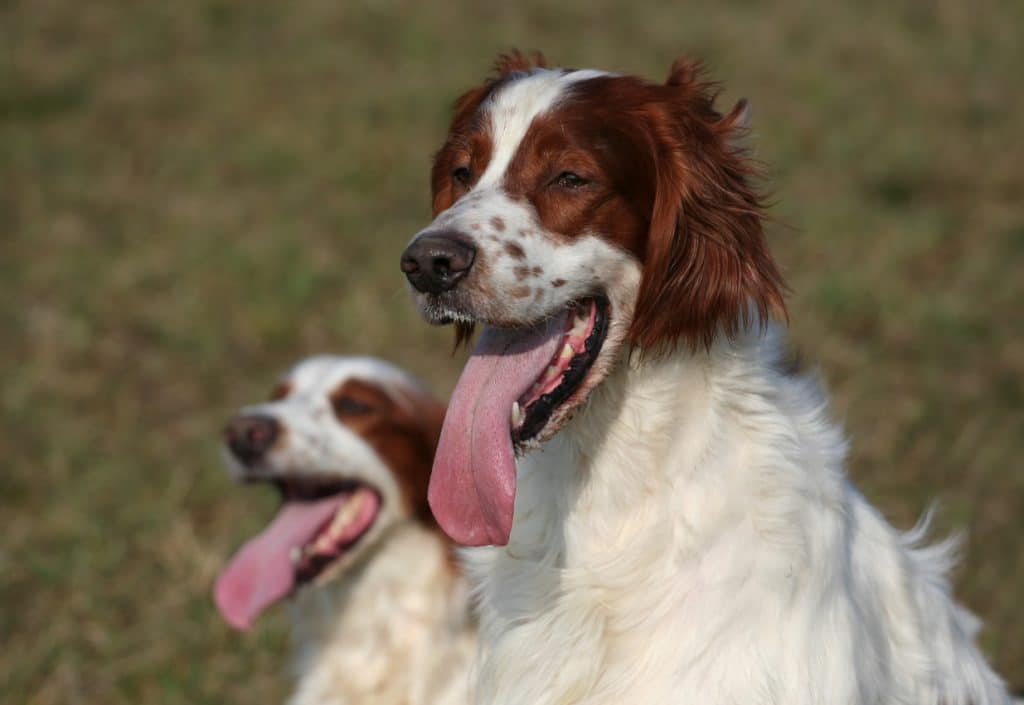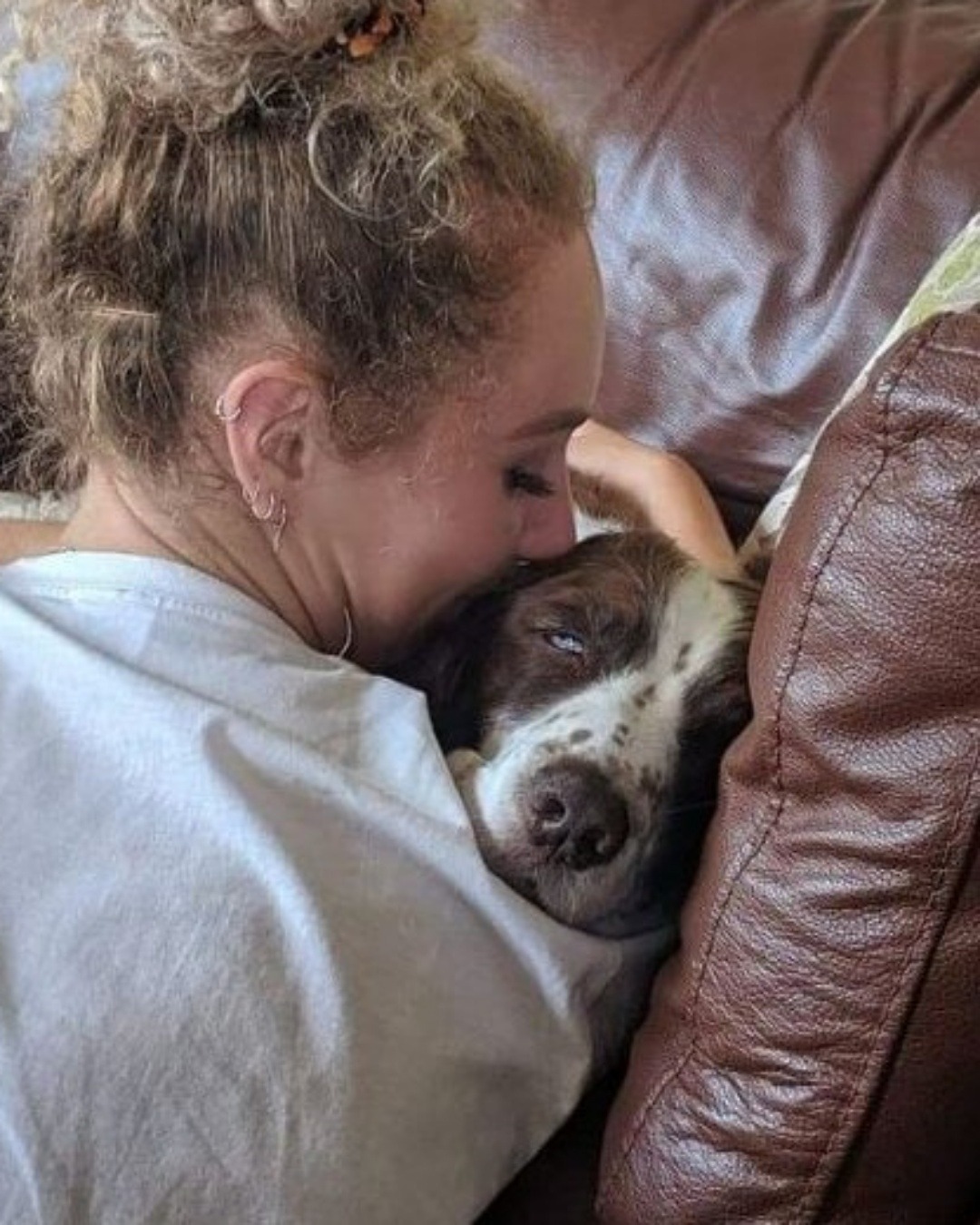A Quiet Ritual of Belonging
In a home made lively by usual routines—dinner laughter, the soft hum of evening TV, and the comforting presence of a loyal dog—there stood a moment that many families know without naming it. For years, the dog named Spike curled up on the bed each night, nestled between his human companions, safe and adored. It was never just sleeping; it was belonging. It was a wordless conversation of trust, comfort and connection.
As the years passed, Spike’s body slowed down. His legs, once confident in the climb upstairs, began to hesitate. The bedroom that had been his sanctuary was now out of reach. So, his family made a decision: they moved their own sleeping area downstairs—blankets and pillows spread across the floor—so Spike could stay beside them.
It might sound unusual to some. After all, it is “just a dog,” they might say. But for the family who has lived the simple devotion of a pet’s lifelong presence, it is anything but “just.” Their choice invites us to ask: what does it mean when we bring an animal into our lives? What are we willing to do for the one who has given us their whole heart?
In Spike’s story we see themes of loyalty, aging, devotion and the human-animal bond. And while this may feel deeply personal, it also touches on something universal: how we navigate care, presence and meaning in relationship with other living beings.

The Cultural and Mythical Significance of the Loyal Dog
The relationship between humans and dogs is ancient, and the stories we tell reflect that. Across cultures, dogs appear not merely as pets, but as companions, guardians, symbols of fidelity and guides in transitions. In some traditions they appear as spiritual bridges between worlds, in others as figures of instinct and protection.
For instance, in dream analysis a dog might symbolize emotional support, intuition or enthusiastic loyalty (This Jungian Life). The web of myth carries dog-figures that accompany souls, guard thresholds or stand by their humans in mythic form (Wikipedia).
One may look at the decision to stay downstairs with Spike not just as a practical act of accommodation but as a ritual of honour. The family acknowledges that Spike isn’t simply a member of the home: he is part of its story. The architecture of their daily life adjusted to hold him. In some sense that echoes ancient stories of loyalty and companionship.
When we consider dogs in folklore, we see them as figures of steadfastness. In one view, Spike’s nightly presence beside his humans becomes a living mirror of those symbolic roles—steadfast companion, witness, quiet anchor. The emotional weight of the act—moving one’s bed for the dog—can be understood as a modern expression of an age-old motif: that loyalty is worthy of reciprocation.

The Science Behind the Bond
While Spike’s story warms the heart, the science behind the human-dog relationship gives it context and dimension. Decades of research now support what many pet-owners intuitively feel: owning and living with a dog can bring measurable benefits.
Studies show that interacting with dogs may reduce stress, anxiety, feelings of loneliness, and even contribute to better heart health and social connection. For example, a comprehensive article found that pets can decrease stress and improve emotional and social skills in children (NIH News in Health). Research published in peer-reviewed journals indicates that dog ownership may reduce both short-term and long-term loneliness and improve mental well-being (PMC).
From a physiological perspective, spending time with one’s dog may trigger release of oxytocin—the so-called “bonding” hormone—and reduction in cortisol, a stress marker (Johns Hopkins Medicine). One large-scale lifestyle article explained that dog owners often report better cardiovascular outcomes, and that simple acts like walking a dog or petting them help increase physical activity and social interaction (Mayo Clinic Health System).
In turn, the decision to adjust home patterns to accommodate Spike’s age takes on additional meaning: it’s not only a compassionate act but one that aligns with the science of connection. The presence of a loyal dog such as Spike supports emotional rhythms—habits that boost well-being for both the dog and the human family.

Age, Ritual, and Shared Vulnerability
A deeper layer of Spike’s story lies in the phase of aging—his physical decline and the family’s response. Dogs age in our homes; we see them lose spring in their step, hesitate at stairs, rest more deeply. Just as we face our own aging and limitations, so do our animal companions.
The family’s move to share the bed downstairs signals an acknowledgement of vulnerability, an acceptance of change. It transforms a routine into an act of presence: staying beside rather than moving ahead. It asks the question: what does it mean to stay with someone when life changes?
In many ways, caring for an older dog reminds us of the mutuality at the heart of relationships. Spike once offered comfort, humor and faithful presence. Now the humans adjust their home for him. They show that relationships morph, roles shift, and devotion matters across the life cycle.
From myth to science, we can see parallels. Many cultures honor the elder, the companion whose strength wanes, yet whose value remains. And present-day studies highlight the benefits of caregiving relations, for both the receiver and the giver. The act of staying close, staying present, may itself be a source of meaning.

What This Means for All of Us
Spike’s story invites reflection for pet-owners and non-pet‐owners alike. It prompts questions about what we owe to the beings we welcome into our lives. Loyalty, after all, isn’t only about the energetic years; it is about staying when things change. The family’s choice may appear small—moving the bed, spreading blankets—but it holds symbolic weight. It says: You are part of us. We will stay with you.
For pet owners, this story may mirror many quiet decisions: adjusting routines, giving time, offering comfort. For others, it points to the deeper truth of emotional investment: whether in a pet, a friend, a parent, or ourselves, presence over time matters.
We may also consider broader take-aways: the value of everyday acts of devotion, the ways small changes in habit reflect big shifts in intention, and how caring relationships blend into home life quietly but powerfully.
In the scientific sense, living with a loyal dog like Spike supports emotional health; in the cultural sense, staying beside a companion in aging recalls rituals of honour and love; and in the personal sense, the story invites us to ask: how do I show my loyalty when life changes?

Reflection on Human Curiosity
Humans have long been curious about the bond between our species and our companion animals. We weave stories, we study hormones, we adjust our houses and our routines. Spike’s story is a gentle testament to that curiosity—curiosity not just about animals, but about meaning, devotion and connection.
Through myth we remember dogs as symbols and guides; through science we measure the effects of their presence; through daily life we respond to their aging and presence. In all this, the thread remains steady: love, in its many forms, invites us to stay, to adjust, to belong.
And perhaps most of all, it invites us to ask: in a world of changes, how do we remain present for the ones who have stayed with us? Whether they walk on two legs or four, the answer may be the same.
Sources
American Kennel Club – 10 Science-Based Benefits of Having a Dog
American Kennel Club
National Institutes of Health (NIH) – The Power of Pets
NIH News in Health
BMC Public Health – Companion Dog Acquisition and Mental Well-being
BioMed Central
Journal Frontiers in Psychology – Dogs and the Good Life: Association with Well-being
Frontiers
Harvard Health – The Heart-felt Benefits of Pet Ownership
Harvard Health
The Guardian – Owning a Dog Boosts Brain Power in Older Adults
The Guardian
